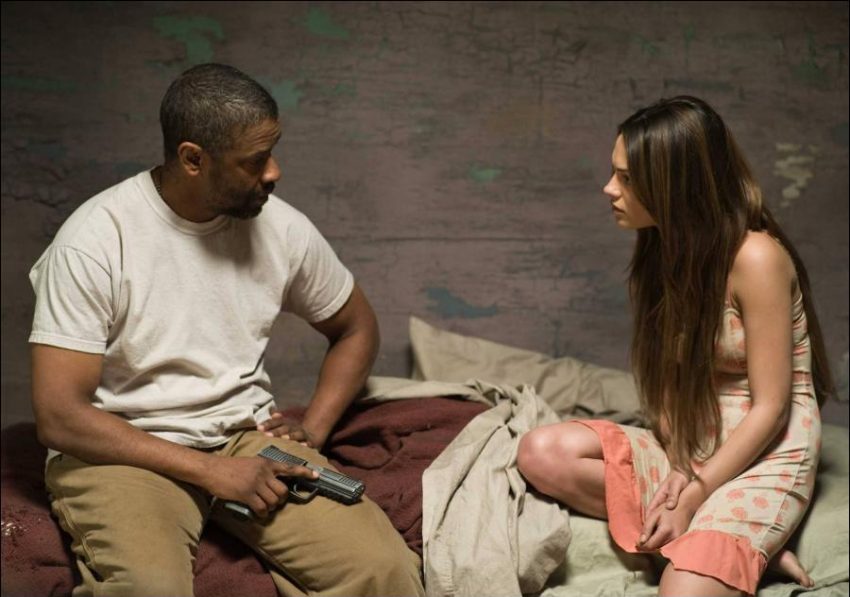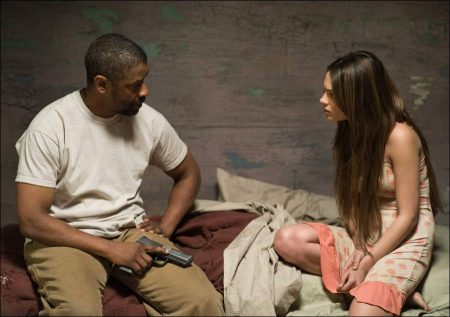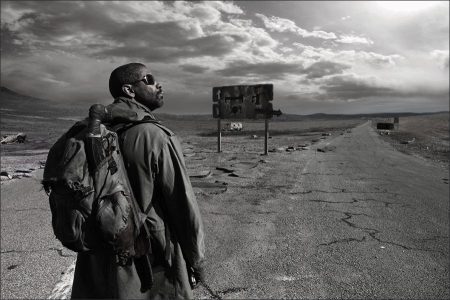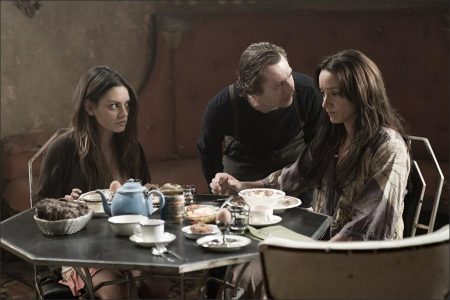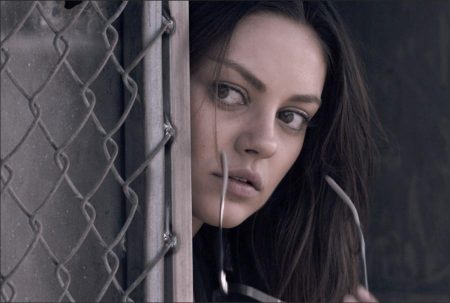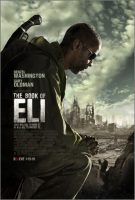Taglines: Some will kill to have it. He will kill to protect it.
Eli is a warrior not by choice by necessity. He seeks only peace but if he is challenged, he will cut his attackers down. His hope is for the future and he does what he must to survive and continue. Carnegie is the self-appointed despot of thieves and gunmen that wants Eli’s power.
In the not-too-distant future, some 30 years after the final war, a solitary man walks across the wasteland that was once America. Empty cities, broken highways, seared earth-all around him, the marks of catastrophic destruction. There is no civilization here, no law. The roads belong to gangs that would murder a man for his shoes, an ounce of water…or for nothing at all. But they’re no match for this traveler.
A warrior not by choice but necessity, Eli (Denzel Washington) seeks only peace but, if challenged, will cut his attackers down before they realize their fatal mistake. It’s not his life he guards so fiercely but his hope for the future; a hope he has carried and protected for 30 years and is determined to realize. Driven by this commitment and guided by his belief in something greater than himself, Eli does what he must to survive-and continue.
Only one other man in this ruined world understands the power Eli holds, and is determined to make it his own: Carnegie (Gary Oldman), the self-appointed despot of a makeshift town of thieves and gunmen. Meanwhile, Carnegie’s adopted daughter Solara (Mila Kunis) is fascinated by Eli for another reason: the glimpse he offers of what may exist beyond her stepfather’s domain.
But neither will find it easy to deter him. Nothing-and no one-can stand in his way. Eli must keep moving to fulfill his destiny and bring help to a ravaged humanity.
“One day I heard this voice, like it was coming from inside me. It led me to a place…I found this book, buried deep in the rubble… And the voice told me to carry it west.”
“What we liked about this story was that it was an action adventure but it also had something to say about commitment, sacrifice, survival and human nature,” offers Allen Hughes, who, with his twin brother, Albert, directed “The Book of Eli.” It is the fifth feature film for the pair, who made their auspicious debut at age 20 with the powerful and acclaimed inner-city drama “Menace II Society.”
Says Albert Hughes, “`The Book of Eli’ takes us to a future that is decimated-whether by war, nuclear or natural disasters, or any combination of events, it doesn’t matter. The devastation is total and that allowed us to speculate about how the world would look and how people would manage if the whole grid was wiped out and we were thrown back into a primitive way of life. There would be a lot of lawlessness. But, in time, there might be a few brave individuals who would regain a sense of purpose and take up the mantle of leadership.”
Eli is one of these few. In a time when people are either hunter or prey, he dares to be a free man, committed only to his belief in what he’s doing and his determination to see it through. But the price he pays for following his conscience is harsh. Without respite, without a home…nearly every day brings him into fresh peril and another fight against the forces that would drag him and whatever is left of society into an ever-deeper abyss.
Denzel Washington was so taken with the story that, when initially approached for the title role, he also signed on as a producer. “It’s an interesting journey,” he acknowledges. “Eli is a man on a mission of great importance that he’s been pursuing for a long time. When we meet him, he’s nearing the end of it but his greatest tests are still to come.”
Exactly who Eli is-where he comes from and where he is going-remains largely, and intentionally, a mystery. Says Allen Hughes, “A character like Eli, the enigmatic lone warrior, is almost mythical. You know there’s a rich back story, but it shouldn’t be entirely revealed, and Denzel was conscientious about doing little things that would shed light into his past without spelling it out. One of his ideas was for Eli to bear a burn scar on his back as a mark of the catastrophe he has survived. He was very good at painting in those kinds of details that would add to Eli’s mystique.”
“Denzel really got into the soul of the movie, taking it beyond the adrenalin rush of action,” says producer Broderick Johnson. “His performance makes you want to take that walk with him, to be moved by Eli’s quest and the obstacles in his way.”
Adds Johnson’s longtime producing partner, Andrew A. Kosove, “One of the themes of the film is about believing you can do something that needs to be done, and then following through. Eli has a hard road to travel, literally, but he believes he can succeed. He has a driving faith in what he’s doing.”
But if it’s this conviction that keeps Eli focused, it’s his quick wits and quicker fists that keep him alive. Producer Joel Silver, the force behind some of Hollywood’s most memorable action films, addresses the character’s dual nature. “He has a mission to fulfill. If people try to divert him from it or stop him for any reason, then he will, quite simply, do whatever is necessary to get past them. I think you’re inclined to forgive his actions because, at his core, he’s an honest and peaceful man, and this mission is the most important thing in the world to him.”
“Part of what makes Eli heroic is this focus on the future. He is constantly moving forward,” notes producer David Valdes. “I’m a real movie fan. I love the classic struggle of good versus evil, and I especially love to see a hero who believes in the future as much as Eli does. It speaks of hope.”
The most formidable of Eli’s obstacles is a man named Carnegie. Like Eli, he is one of the few living relics from “the time before” and carries the burden of remembering how things used to be. “There’s a line in the movie where Eli explains, `People kill each other now for things we used to throw away,’ and he’s talking about basic things like soap or matches, that are now rare and valuable commodities,” reveals Albert Hughes.
Unlike Eli, Carnegie has devoted the past 30 years to amassing a crude empire amid the ruins of an abandoned town and his taste for power has grown. He is accustomed to getting what he wants, and what he wants now is a book that Eli carries in his pack-a Bible, believed to be the last one on Earth.
“It’s a great mano a mano dynamic between these two men in total opposition. Each of them wants the same thing but for entirely different reasons, and they are equally determined not to give up,” Silver says.
In his role as filmmaker, Washington contributed significantly to the development of Eli’s nemesis. “Denzel started fleshing out the Carnegie character, first, in pre-production, saying, `The good guy is only as good as the bad guy is bad,’” recalls Allen Hughes. “We’d talk about whether or not Carnegie was a true villain or just a man caught in desperate times who does bad things as a means to an end. With Carnegie, things are not black and white, but gray. The remnants of his humanity make him all the more unpredictable.”
Continue Reading and View the Theatrical Trailer
The Book of Eli (2010)
Directed by: Allen Hughes, Albert Hughes
Starring: Denzel Washington, Gary Oldman, Mila Kunis, Frances de la Tour, Ray Stevenson, Jennifer Beals, Karin Silvestri, Michael Gambon, Chris Browning, Keith Splinter Davis, Lateef Crowder
Screenplay by: Gary Whitta, Anthony Peckham
Production Design by: Gae S. Buckley
Cinematography by: Don Burgess
Film Editing by: Cindy Mollo
Costume Design by: Sharen Davis
Set Decoration by: Patrick Cassidy
Art Direction by: Christopher Burian-Mohr
Music by: Atticus Ross, Leopold Ross, Claudia Sarne
MPAA Rating: R for some brutal violence and language
Distributed by: Warner Bros. Pictures
Release Date: January 15, 2010
